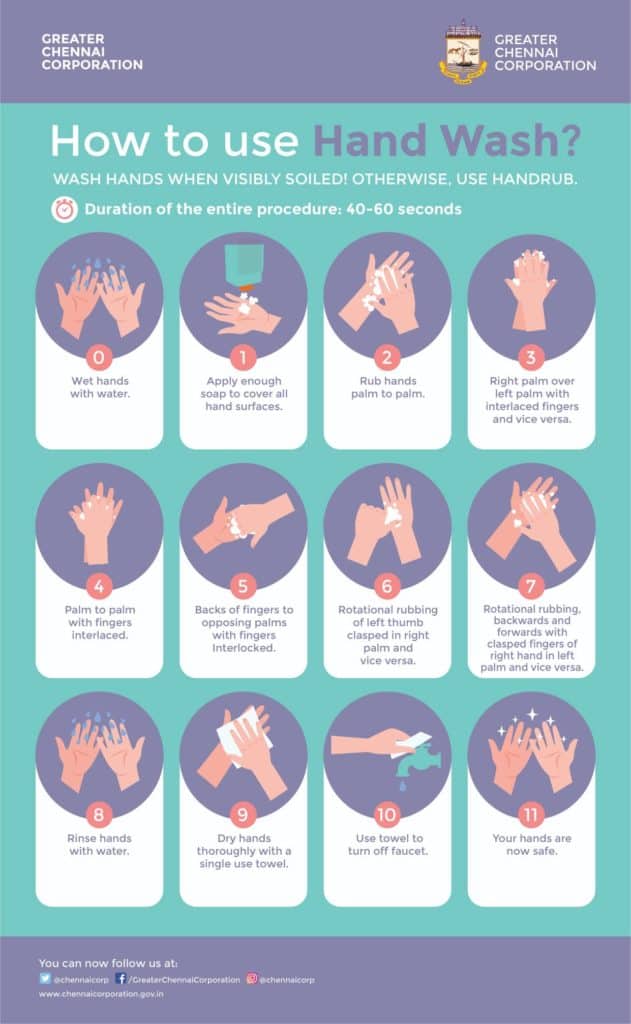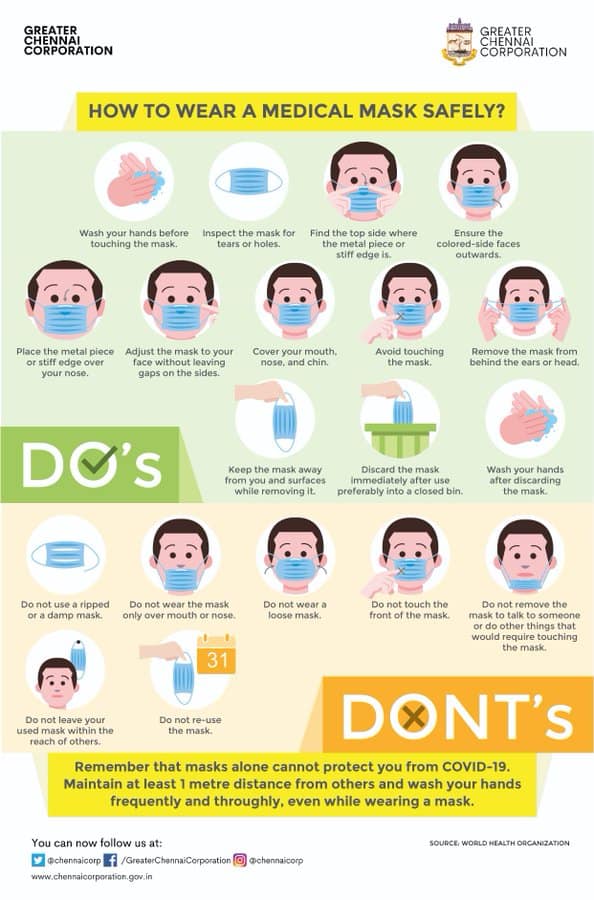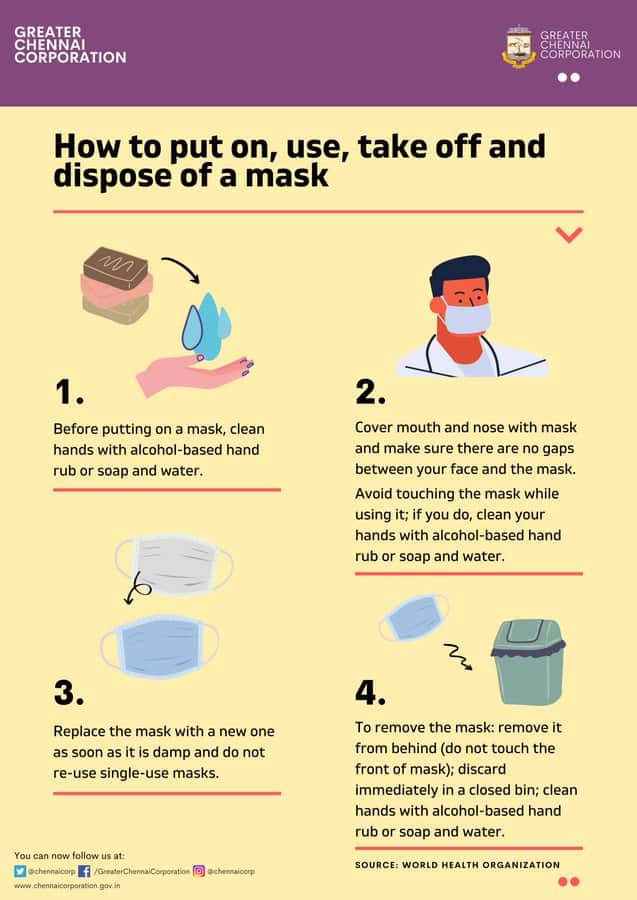It took Chennai just two months to hit the 24,000-mark in COVID-positive counts. Economic compulsions, however, have led the administration to take steps towards easing restrictions in some areas. Stand alone shops, salons and dine-in restaurants have resumed operations in a number of areas. And it is increasingly becoming evident that people will have to learn to live with the virus for some more time to come.
Masking up, frequent handwashing, physical distancing – these are some of the steps that we must follow as we gradually adapt to life in a post-COVID world.
Below are a few standard protocols and precautions that we must adhere to and follow in the current situation:
Home isolation advisory for COVID patients
According to the revised norms of the State health department, asymptomatic or presymptomatic patients, or those with mild symptoms, must isolate themselves at homes. The Chennai Corporation recently issued a set of guidelines for such patients.
- Stay in a well-ventilated separate room, which should be disinfected frequently.
- Do not leave home for the next 14 days after you have received the COVID-19 test result as positive. People staying with the patient are also suggested not to step out.
- Patients are advised not to wander elsewhere within the house, other than the isolation room.
- Stay away from family members especially elderly people, children, pregnant women and pets.
- Avoid meeting relatives and visitors.
- Maintain your belongings separately and avoid sharing with others
- Always wear a mask. Change the mask every 6 to 8 hours and dispose of it properly in a closed dustbin (see below). Disposable masks are never to be reused. Masks that are made of cloth can be reused after washing and drying in the sunlight properly.
- Use a separate bathroom/toilet and disinfect them frequently.
- Wash your hands frequently with soap and water for at least 20 seconds.
- Cover your mouth with a handkerchief or cloth during sneezing or coughing.
- Do not touch your nose, mouth and eyes without washing hands with soap and water.
When to discontinue home isolation
A patient is advised to discontinue home isolation after 17 days of onset of symptoms (or date of sampling, for pre-symptomatic cases) and no fever for 10 days. There is no need for testing after the home isolation period is over.
Medical consultation through video calls can be sought through Greater Chennai Corporation’s GCC Vidmed application.
What safety measures should be taken while taking care of a COVID-19 patient at home?
- Wear a mask: Do not forget to wear a mask when you are treating a sick patient. Masks used by patients/caregivers/close contacts during home care should be disinfected using ordinary bleach solution (5%) or sodium hypochlorite solution (1%) and then disposed of either by burning or deep burial.
- Anyone assigned family member should take care/help the affected person.
- Wash hands: Frequently wash your hands thoroughly with soap and water.
- Use dedicated dishes, cups, towels and bed linen for the ill person.
- Food must be provided to the patient in his/her room. Utensils and dishes used by the patient should be cleaned with soap/detergent and water, wearing gloves. The utensils and dishes may be reused.
- Clean hands after taking off gloves or handling used items.
- Identify the surfaces frequently touched by a sick person and disinfect those surfaces daily.
- Wear gloves while handling sick people’s clothing.
How to wash your hands

How to use a mask


How to wash and dry clothes after returning from office/outdoors
- Wash immediately. Put your clothes for washing immediately after you reach home and not on the sofa or the bed.
- Wash your clothes thoroughly with detergent and do not forget to wash the corners and the folds.
- Always wash your clothes with warm water — 40 degree celsius to 60 degree celsius.
- Put your clothes out in the sunlight for drying.
- Wash your hands thoroughly with soap and water after washing your clothes.
How to take care of pets
- Spend time: Your pets are used to having you around. As the city is unlocked, try gradual weaning off.
- No long walks: Keep your walks with your pet short and within the neighbourhood. Gradually increase the time.
- Avoid going to or hosting pet parties until normalcy bounces back.
- Wash your hands thoroughly with soap and water each time you return from the walk.
- Sanitise: Spray the leash and collar with sanitiser once back home.
- Vaccination: If vaccination is due, please follow social distancing while going to the veterinarian.
How to handle coins and banknotes
- There is currently no evidence to confirm or disprove that the COVID-19 virus can be transmitted through coins and banknotes. However, prevention is better than cure. Respiratory droplets expelled from an infected person can persist on surfaces.
- Wash hands thoroughly after handling notes and coins.
- Avoid touching your eyes, mouth and nose, if your hands are not washed.
How to use an ATM
- Wear a mask and maintain social distancing.
- Avoid touching the areas of an ATM unnecessarily.
- Avoid using ATMs if you are sick.
- Never dispose of used tissue papers and masks inside the ATM lobby.
- Use keys, card to touch the ATM screen.
- Wash hands. On returning home, wash your hands thoroughly with soap and water.
If you have any symptoms like fever, cough, sore throat and difficulty in breathing, immediately contact 044 2538 4520, 044 2538 4530, 044 2538 4540, 044 4612 2300 for medical assistance.
(All inputs sourced from Greater Chennai Corporation’s explainers and Ministry of Health and Family Welfare, Government of India guidelines.)